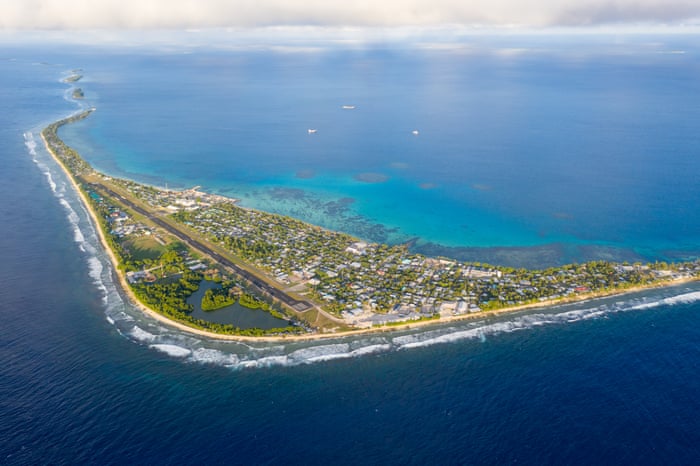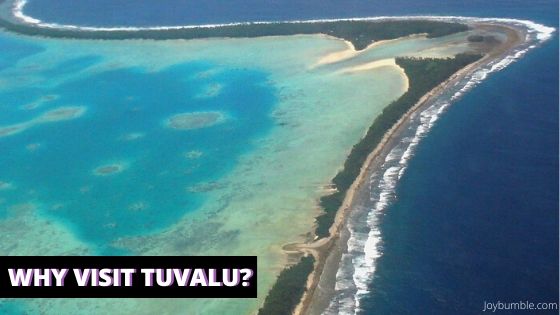Tuvalu is a group of nine tiny islands which, from 1892 to 1916, were part of the British Western Pacific Territories as a British Protectorate. The islands became independent on 1 October 1978. Formerly known as the Ellice Islands, they are mostly low-lying, with no point in Tuvalu being over 4.5 m above sea level. Five of these islands are coral atolls, while the remaining four consists of land emerging from the sea bed.
Located in the Central Pacific Ocean, This Polynesian island nation is just below the equator and about 1,000 km north of Fiji and about 2,000 km east of the Solomon Islands. Tuvalu is the fourth-smallest country in the world, and the islands cover an area of only 26 km lying between Australia and Hawaii. Most people do not even know that it exists, so it is one of the least visited countries in the world.
The island nation has a population of about 11,000, while the island of Funafuti is the capital. Vaiaku in Funafuti serves as the main town. The other islands are Nanumanga, Nanumea, Niulakita, Niutao, Nui, Nukufetau, Nukulaela, and Vaitupu. The locals speak both Tuvaluan and English, the latter being the lingua franca, used for business purposes.

Land
This group of islets consists of both atolls and reef islands. Only the rainfall and wells provide fresh water as there are no rivers present, and because soils are porous, agriculture is constrained. Coconut palms grow best in the area. Bread-fruit plants, pandanus, taro, and bananas have also been planted. The meat source comes from the Pigs and chickens, which are reared here. The sea is also a great source of food as you can enjoy the amazing seafood like seabirds, trout, and shellfish, etc.
Climate
Tuvalu experiences a warm, rainy atmosphere all year round. Easter trade winds regulate the weather from March to November, and west winds carry heavy rain from November to March. Natural disasters do not often arise here, but the low level of islands renders them prone to flooding due to the increases in sea levels. Temperatures generally range from 80 to 85 ° F (27 to 29 ° C).
Cultural Life
To a certain degree, Tuvalu’s culture has become westernized, but Western-style services are limited. The government publishes a brief newsletter, but there is no newspaper, a few motion pictures are shown, but satellite television is only obtainable through subscription. There is only one radio station and a regular supply of electricity is only available in Funafuti.
Most Tuvaluans live in villages of a few hundred people. They tend their gardens, and fish from handmade canoes. Amid modernization, Tuvaluan life focuses on a solid traditional basis that stresses the value of collective agreement and identification.
Transport
You can only fly in and out of the country by airplane, and the best way to travel and get around the main island of Funafuti is by motorbikes, which local people call here Fongafale. You can hire these for a unique experience for as little as $10 a day. It is how people all move around town. It is also a perfect opportunity to see the island in its true form. There are no flights to travel to the outer islands of Tuvalu; the other islands are only accessible by boat.
The Tuvaluan Community
There is a real sense of community here on this amazing island. The people are warm, kind and generous and will be glad to help you in any way they can. Their relaxed lifestyle will definitely make you feel at ease. Plus it is also considered one of the safest places on earth as far as crime goes so that really speaks for itself.
The Tuvaluan people really have close family with often all their family living in the same house and raising their kids together. Also there is a really lovely tradition that when they grow up with a close friend they can be invited to become their brother/sister.
This man here visits Tuvalu, You may enjoy this little watch.
Things to do
With beautiful scenery and a peaceful environment, Tuvalu is a country perfect for a vacation. The beaches, seafood, perfect temperate climate, and the lack of contact with the rest of the world create a sense of calm over you. A great place to get away from your daily problems. Tuvalu also provides certain perks and activities that will make your visit worthwhile.
- Go off the grid
Tuvalu ‘s comfortable island environment, as well as the solitude it provides, is the best way to put the rest of the world behind. It is perfect for relaxing and unwinding from the daily grind. The lack of WIFI or in Tuvalu with the 4G network being the only way to get connected, even though it’s unavailable on a daily basis, adds to the experience.
- David’s Drill:
David’s Drill played a role in putting Tuvalu on the map. In 1896, a Welsh-born Australian geologist drilled to a depth of 200 meters at the Funafuti Atoll in an attempt to prove Darwin’s theory of coral atoll formation. Darwin ‘s ideas were supported by his results; they were short of concrete proof. This main borehole can still be seen today.
- Island hopping:
Tuvalu, as an island nation, offers lots of private islands and atolls. When traveling to a tropical group of islands, islets, and atolls, one of the best things that can be done is exploring them. Tuvalu provides a great opportunity to rent a boat and go island hopping, adding a little sense of adventure to your trip.
- Use the Airstrip:
Much of the time, the runway in Tuvalu is an accessible path, used as a road by the locals. It’s also used as a sports field for village games. When you hear siren air raids, that signals that there’s a flight approaching, and it’s best to get off that path.
- Go snorkeling:
The islands are perfect for snorkeling with bright blue waters and distinct marine species. The beaches are peaceful, rarely busy, protected by coral reefs.

- Find a Wreck:
There’s still a lot of world war II history on the island. Tuvalu was the headquarters for allied forces to strike neighboring Kiribati, which was under the control of Japanese at that time. The islands are riddled with destroyed aircraft and ships. Old airstrips, plane debris, gun posts, and the remains of an aircraft carrier now abandoned on the island, all overgrown by coral and shoaling by fish, can be seen in the village of Nanumea.

- Dance:
The inhabitants of Tuvalu are legendary Polynesian performers, and their own unique traditional Fatale dance can be observed on festive occasions. You can witness area teams perform against each other at the lively Fatale Dance and Music sessions.


